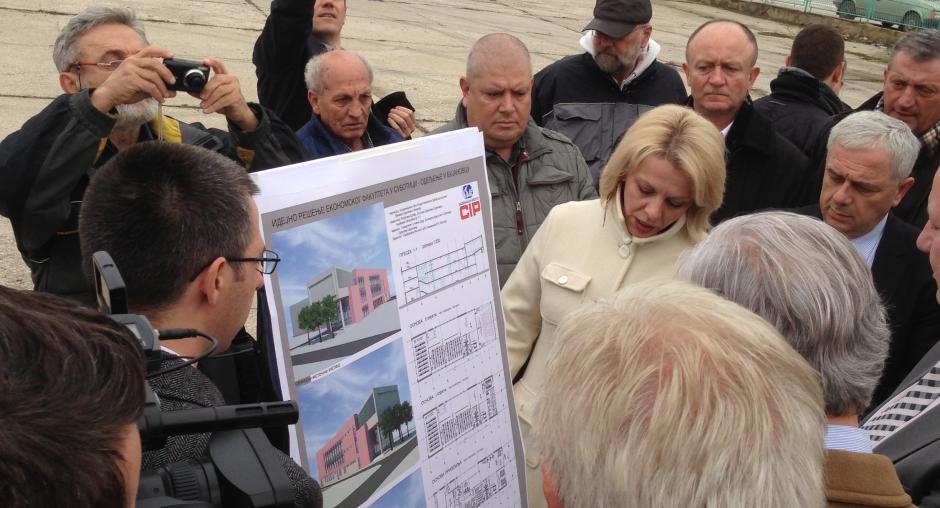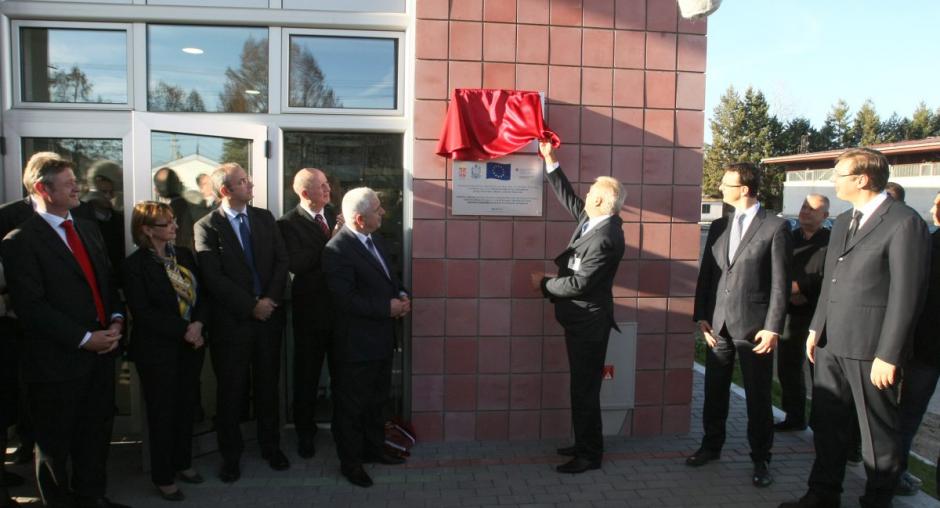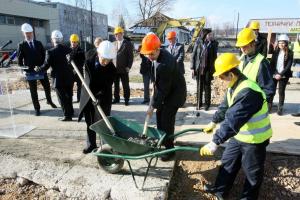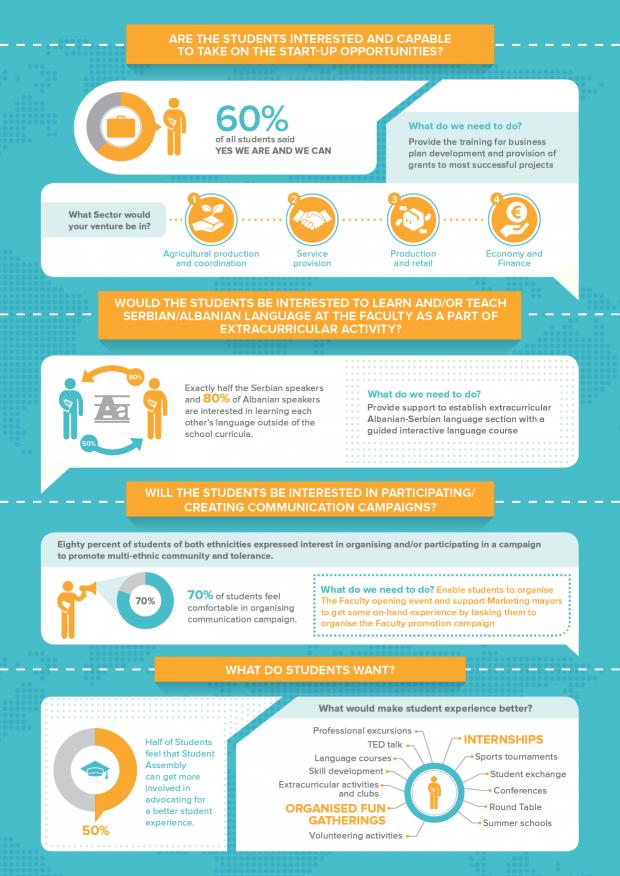Against all odds: Building a multilingual university department in Bujanovac
Four years ago, the Bujanovac Department of the Subotica Faculty of Economics of the University of Novi Sad welcomed its first students to what was an experiment in multilingual higher education in southern Serbia.
Now, the experiment is paying off: on 17 November 2015, 12 students graduated from the Department’s new premises with a degree in economics, becoming the first graduates of the first truly multilingual, multi-ethnic higher-education curriculum in southern Serbia.
“Ten to 15 years ago, this was a dream, given that there was war here. Now we have youth who study together,” says Nagip Arifi, Mayor of Bujanovac.
The long road to inter-ethnic trust
Bujanovac is one of three municipalities in southern Serbia, a region of fertile land and natural beauty that is a victim of its geography and history. After the Kosovo War ended in 1999, an insurgency by ethnic Albanians erupted inside a NATO-established buffer zone here.
Today, tensions remain, although they are muted. As with many areas in the OSCE, integration remains a challenge. Ethnic Albanians and ethnic Serbs live largely parallel lives, attending separate schools, living in different districts and rarely learning each other’s languages.
The OSCE established the High Commissioner on National Minorities (HCNM) in 1992 in response to the inter-ethnic conflicts emerging as the former Yugoslavia and the Soviet Union broke apart. Nowhere was this challenge to European security better epitomized than in Yugoslavia, which fractured along ethnic lines and descended into conflict.
The core of the HCNM’s mandate is to act as “an instrument of conflict prevention at the earliest possible stage.” This involves containing and de-escalating tensions involving national minorities within the OSCE area. All the HCNM’s work requires persistence, and that is why, when former HCNM Knut Vollebaek attended the opening of the Bujanovac Department of Economics in June 2012, he was not only celebrating a milestone in a process that had already been three years in the making, but also marking the start of another fraught period just to keep the Department running.
Building an institution, brick by brick
Astrid Thors, who succeeded Vollebaek as HCNM the following summer, took over the project and became the Chairperson of the Stakeholders’ Committee, which brings together the parties involved to ensure the proper running of the Department. It also includes representatives of Serbia’s Education Ministry; the Co-ordination Body for the Municipalities of Preševo, Bujanovac and Medveđa; the Rector of the University of Novi Sad; the University’s Subotica Faculty of Economics of the University of Novi Sad; the Municipality of Bujanovac; the National Council of the Albanian National Minority (Albanian NMC); the EU Delegation to Serbia; European PROGRES/UNOPS; and the OSCE Mission to Serbia.
During the summer of 2013, it became obvious that the Department could not continue operating out of several temporary rented premises scattered around the town. The stakeholders felt that the only way to put the Department on a firm footing for the future would be to build permanent premises. Fortunately, the EU, together with the Swiss Government, was able to provide funding for expropriating the land and building the permanent premises.
“The EU sees the Bujanovac Department as offering hugely important opportunities for a multi-ethnic student population, consolidating Bujanovac's status as a student town, and pointing the way to future economic opportunities as Serbia moves forward towards EU accession,” says EU Ambassador to Serbia Michael Davenport, on why his organization provided funding.
Graeme Tyndall, Programme Manager of European PROGRES/United Nations Office for Project Services (UNOPS) in Serbia, which implemented the project, said some colleagues were sceptical about the seven-month deadline to complete the building. “However, where there is a will there is a way, and certainly the willingness to succeed of all stakeholders, regardless of politics, was the key.”
The building of the new premises within the deadline shows what can be achieved through partnership, says Professor Zoran Stanković, President of the Co-ordination Body for the three municipalities. “It shows that we can do anything if we work together.”
Boosting development and finding jobs
Gaining an education is, however, only part of the solution.
Recognizing that the region remains economically depressed and jobs are hard to find, Thors is focusing on raising the employability and entrepreneurial spirit of the students.
With the new premises ready, the focus of our co-operation in the Stakeholders’ Committee must be to ensure the quality of education, the employability of the graduates and, last but not least, that the Department continues to foster good relations between students of different backgrounds.
Astrid Thors OSCE High Commissioner on National Minorities
Three years ago, we spoke to two of the Department’s first students – Xhabir Aziri, an ethnic Albanian, and Miodrag Guševski, an ethnic Serb – about why they had chosen to study in their home town. Upon graduating, their next concern now is whether they can find jobs.
“The economy is really bad and it is difficult to find a job but I want to stay here. I have learned a lot of Serbian and I hope it will help me find a job,” said Aziri.
Guševski says he would like to progress in his career.
“Studying this course gives me a better chance. It would be nice if the Serbs could have the opportunity to learn Albanian as well,” he says.
Jeff Bieley, who works at the OSCE Mission to Serbia’s office in Bujanovac, says that the Department has contributed to society, “but, to show it has real value, the graduates need to find jobs. This will need to be supported through subsidies at first, but I think it will pay off. It will be important for the government and the municipality to fund internships.”
The good news is that the business community is ready to employ the graduates.
Gafur Fazliu runs a construction materials company and says that qualified and experienced people were previously difficult to find.
“We have already employed two students on internship programmes and they are good employees. In the future, the Department will be very useful. We are planning to expand and we will need more skills.”
The quality of education should be a priority
Most of the stakeholders hope that the Department can be developed into a centre of regional excellence and attract students from the wider region. This will benefit the youth of southern Serbia and will also contribute to turning Bujanovac into a university town.
And everyone, stakeholders, students and business community alike, agrees that more courses need to be added.
Jonuz Musliu, President of the Albanian NMC, said: “If we just have one course, we will produce too many managers. Soon we will be able to export graduates. We need new courses.”
Bieley says there has been the idea that a teacher’s college would be a good addition.
“We need to ensure that supply is meeting demand. Otherwise we will just see a brain drain,” he said.
Breaking down stereotypes
In all the ambitious talk of turning the Department into a centre of educational excellence, boosting economic development and improving employment, the question is, has it delivered on its original objective?
“Yes,” says Eric Manton, formerly of the OSCE Mission to Serbia’s office in Bujanovac. “It has become a mechanism to improve integration, and it has provided a venue for different ethnicities to integrate.”
According to a survey by European PROGRES/UNOPS conducted earlier in 2015 among the Department’s students, almost two-thirds of students are interested in learning each other’s languages.
“I believe this is a good chance for Serbs and Albanians to study together in one class,” says Ermal Rexhepi, Department co-ordinator. “This will help teach them tolerance and how different ethnicities can work together. Now I see students making friends and socializing together. They learn not be hostages to what they see on TV.”
Musliu added: “Education is a key issue for the Albanian NMC. Only educated citizens can serve as a bridge between nations and people.”
All the stakeholders, students and others involved somehow in the project have expressed their enthusiasm for the achievements so far.
Peter Burkhard, Head of the OSCE Mission to Serbia, says, “This project is nice because it’s one of the few really positive projects we are involved in,” he says. “It’s not a project against anything. We are creating something positive together.”












